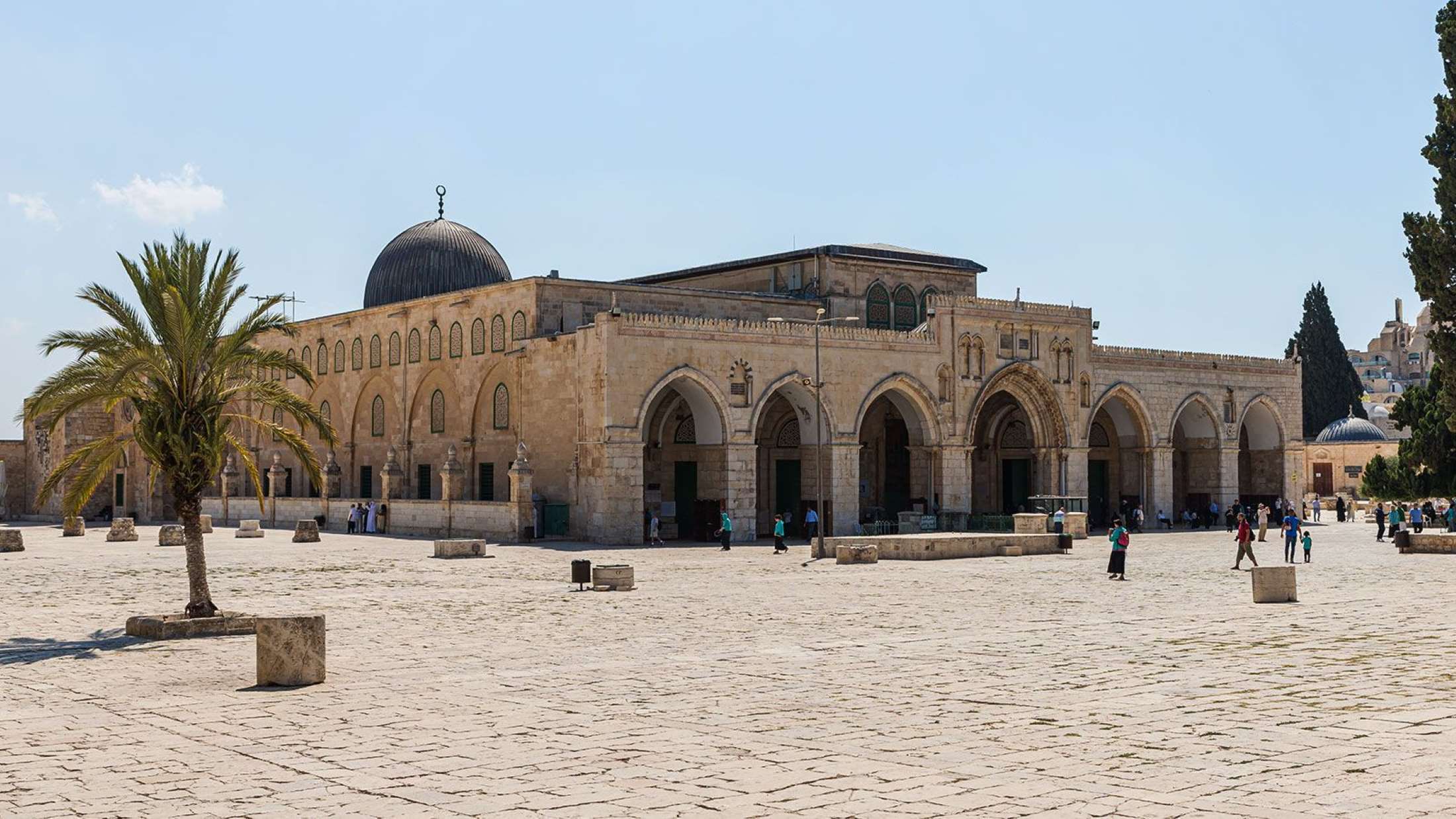
The Al-Aqsa Mosque is one of the most revered religious sites in the world, holding immense historical and cultural significance. Situated in the heart of the Old City of Jerusalem, this iconic landmark has a rich and diverse heritage that spans centuries. It serves as a focal point for Muslims, attracting millions of worshippers each year who come to pray and seek spiritual solace. However, the significance of the Al-Aqsa Mosque extends far beyond its religious importance. With its stunning architecture and captivating history, this sacred site has fascinated scholars, archaeologists, and tourists alike. In this article, we will explore seventeen astonishing facts about the Al-Aqsa Mosque, shedding light on its significance and the fascinating stories that surround it.
Key Takeaways:
- The Al-Aqsa Mosque is a historic and sacred site, known for its vast size, intricate architecture, and resilience through challenges and damages. It holds deep religious and historical significance for Muslims worldwide.
- The mosque serves as a symbol of religious coexistence and has inspired architectural styles across the Islamic world. It continues to be a site of spiritual significance and prayer, welcoming both Muslim and non-Muslim visitors.
The Al-Aqsa Mosque is one of the oldest mosques in the world
The Al-Aqsa Mosque, located in the Old City of Jerusalem, holds historical significance as one of the oldest mosques in the world. Its construction dates back to the early Islamic period in the 7th century.
It is considered the third holiest site in Islam
For Muslims, the Al-Aqsa Mosque is a sacred place and is considered the third holiest site in Islam, after the Kaaba in Mecca and the Prophet’s Mosque in Medina.
The mosque covers a vast area
Al-Aqsa Mosque spans over 144,000 square meters, making it one of the largest mosques in the world. Its open courtyard can accommodate thousands of worshippers during prayers.
It has undergone numerous expansions and renovations
Throughout history, the Al-Aqsa Mosque has undergone several expansions and renovations. Each expansion added to its architectural grandeur and enhanced its capacity to accommodate more worshippers.
It has a significant historical and religious importance
The Al-Aqsa Mosque is not only a place of worship but also holds immense historical and religious importance. It is believed to be the site where the Prophet Muhammad ascended to heaven during the Night Journey.
The Dome of the Rock is located within the mosque compound
Situated within the Al-Aqsa Mosque compound is the iconic Dome of the Rock, an ornate shrine with a gold dome that has become an iconic symbol of Jerusalem.
The mosque has faced several challenges throughout history
Over the centuries, the Al-Aqsa Mosque has faced numerous challenges, including destruction, renovations by different ruling powers, and political conflicts. It has served as a symbol of resilience and faith for Muslims around the world.
The Al-Aqsa Mosque is adorned with intricate architectural details
The interior and exterior of the Al-Aqsa Mosque feature stunning architectural details such as ornate carvings, beautiful tile work, and magnificent arches, showcasing the craftsmanship of different time periods.
It is a significant pilgrimage site for Muslims
Every year, millions of Muslims from around the world visit the Al-Aqsa Mosque as part of their pilgrimage to Jerusalem. The mosque holds deep spiritual and religious significance for Muslims.
The mosque has witnessed historical events
Throughout history, the Al-Aqsa Mosque has witnessed significant events, including conquests, conflicts, and important religious and political gatherings, making it a place of immense historical importance.
It has been a center for Islamic learning
The Al-Aqsa Mosque has long been a center for Islamic education and learning. It has attracted scholars from around the world who have contributed to the spread of Islamic knowledge and teachings.
It is a symbol of Palestinian identity
For Palestinians, the Al-Aqsa Mosque is not only a religious symbol but also a symbol of their national identity and connection to their land. It has played a significant role in the Palestinian struggle for independence.
The mosque has suffered damages over time
Throughout its history, the Al-Aqsa Mosque has suffered damages due to earthquakes, fires, and conflicts. However, it has been reconstructed and restored each time, demonstrating its resilience.
Non-Muslim visitors are welcome
The Al-Aqsa Mosque welcomes non-Muslim visitors who wish to explore its history, architecture, and spiritual significance. However, certain areas may have restrictions for non-Muslims during prayer times.
It serves as a symbol of religious coexistence
The Al-Aqsa Mosque, along with other religious sites in Jerusalem, represents a unique example of religious coexistence. It stands as a testament to the rich diversity of faiths and cultures in the region.
The mosque has inspired architectural styles
The architectural style of the Al-Aqsa Mosque has influenced many other famous structures across the Islamic world. Its distinctive features have been replicated in mosques from Spain to Southeast Asia.
It continues to be a site of spiritual significance and prayer
To this day, the Al-Aqsa Mosque remains a focal point of religious devotion, attracting worshippers who seek solace, pray, and connect with their faith within its historic walls.
Conclusion
Al-Aqsa Mosque is not only one of the most important religious landmarks in the world, but it is also steeped in fascinating history and architectural beauty. These astonishing facts about Al-Aqsa Mosque highlight its significance and provide a deeper understanding of its cultural and religious importance.
From its ancient foundations to its intricate architectural details, Al-Aqsa Mosque stands as a symbol of unity and peace for millions around the globe. Its remarkable history, sacred status, and vibrant cultural heritage make it a must-visit landmark for those seeking to explore the rich tapestry of human civilization.
FAQs
1. What is the significance of Al-Aqsa Mosque?
Al-Aqsa Mosque holds immense religious and historical significance in Islam. It is believed to be the third holiest site in Islam, after Mecca and Medina. It holds a special place due to its association with the Prophet Muhammad’s miraculous Night Journey.
2. Is Al-Aqsa Mosque open to non-Muslim visitors?
Yes, Al-Aqsa Mosque is open to non-Muslim visitors. However, there may be certain restrictions and guidelines to ensure respect for the religious nature of the site. It is advisable to check the visiting hours and any specific regulations before planning a visit.
3. Can women enter and pray at Al-Aqsa Mosque?
Yes, women are allowed to enter and pray at Al-Aqsa Mosque. There are designated areas within the mosque where women can worship and participate in religious activities.
4. What are some notable architectural features of Al-Aqsa Mosque?
Al-Aqsa Mosque showcases a unique blend of architectural styles, combining elements of Umayyad, Abbasid, and Fatimid influences. Its iconic golden dome, intricate tilework, and grand courtyards are among its most remarkable features.
5. Are there any ancient artifacts or relics within Al-Aqsa Mosque?
Yes, Al-Aqsa Mosque houses several ancient artifacts and relics of historical and religious importance. These include ancient Qurans, manuscripts, and religious artifacts that provide a glimpse into the rich history of the site.
6. What is the current state of preservation of Al-Aqsa Mosque?
Efforts have been made over the years to ensure the preservation and restoration of Al-Aqsa Mosque. Various restoration projects have taken place to maintain its structural integrity and safeguard its historical and cultural heritage.
7. How can one visit Al-Aqsa Mosque?
To visit Al-Aqsa Mosque, one must typically go through the Palestinian territories. It is recommended to research and understand the current political and security situation in the region before planning a visit.
8. Can visitors take photographs inside Al-Aqsa Mosque?
Photography is generally allowed in certain areas outside the prayer halls of Al-Aqsa Mosque. However, it is important to be respectful and adhere to any specific guidelines set by the mosque authorities.
Immerse yourself in more captivating facts about Palestine, religious sites, and the iconic Dome of the Rock. Uncover Palestine's vibrant culture and history through fun, lesser-known facts. Explore the architectural wonders and spiritual significance of the Temple of Confucius, a testament to religious devotion. Delve into the mysteries surrounding the Dome of the Rock, one of Islam's most revered landmarks.
Was this page helpful?
Our commitment to delivering trustworthy and engaging content is at the heart of what we do. Each fact on our site is contributed by real users like you, bringing a wealth of diverse insights and information. To ensure the highest standards of accuracy and reliability, our dedicated editors meticulously review each submission. This process guarantees that the facts we share are not only fascinating but also credible. Trust in our commitment to quality and authenticity as you explore and learn with us.


